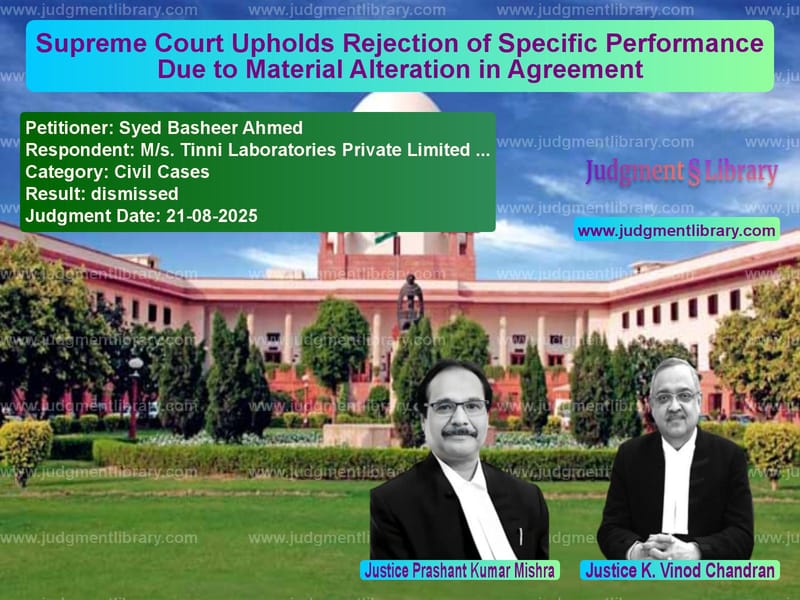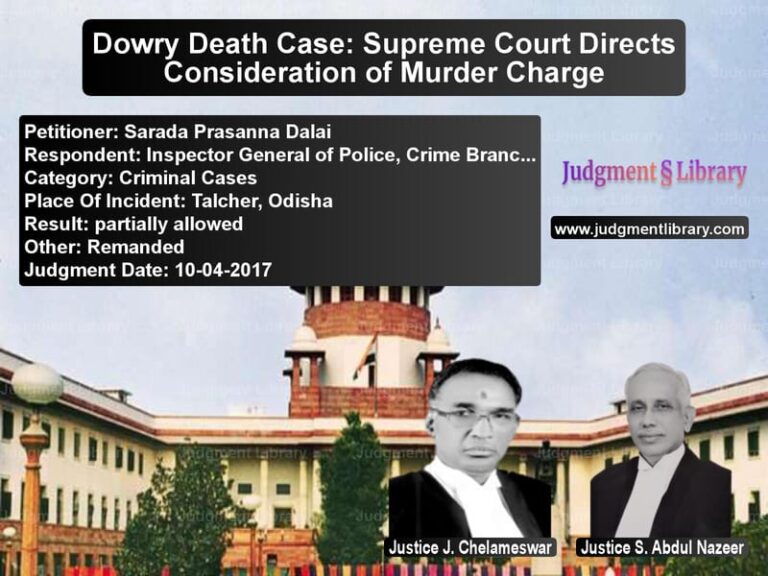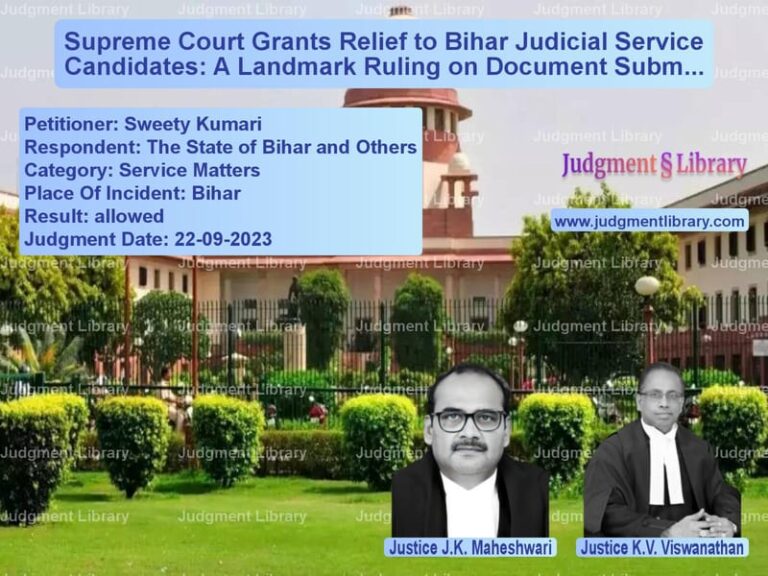Supreme Court Upholds Rejection of Specific Performance Due to Material Alteration in Agreement
In a significant ruling that underscores the importance of document integrity in contractual agreements, the Supreme Court of India recently delivered a judgment that highlights how even minor alterations in legal documents can have far-reaching consequences. The case involved a decades-old property dispute where a seemingly straightforward agreement for sale became the subject of intense legal scrutiny due to apparent material alterations in the document itself.
The legal battle began when Syed Basheer Ahmed filed a suit for specific performance, claiming that an agreement had been entered into on July 15, 1984, for the purchase of two properties referred to as Item No.1 and Item No.2. The agreement stipulated a total sale consideration of Rs.56,000/- with an advance payment of Rs.1,000/- made at the time of execution. The properties in question presented an immediate complication – while Item No.1 was owned by the first defendant, Item No.2 belonged to a third party, though the first defendant allegedly claimed to be in possession of it and asserted that he had an agreement to purchase it from the real owner.
The trial court initially ruled in favor of the plaintiff, decreeing the suit for specific performance. The court found that the plaintiff had demonstrated readiness and willingness to pay the balance consideration throughout the relevant period. Importantly, the trial court determined that time was never the essence of the contract since it had been extended multiple times until February 12, 1985. The court also rejected contentions regarding material alteration in the agreement, paving the way for the decree of specific performance.
However, the case took a dramatic turn when it reached the High Court. The appellate court carefully examined the original sale agreement and made a crucial observation that would ultimately determine the fate of the entire case. The High Court found clear evidence of material alteration in the document, particularly in the recitals concerning Item No.2, which appeared to have been written in different ink. Relying on the precedent set in Seth Loonkaran Sethiya v. Mr. Ivan E. John and Ors., the High Court concluded that these alterations were material in nature and consequently reversed the trial court’s decree.
When the matter reached the Supreme Court, both parties presented their arguments with vigor. The appellant’s counsel, Mr. G. Sivabalamurugan, argued passionately for restoration of the trial court’s decree. He emphasized that the plaintiff had demonstrated consistent readiness and willingness to fulfill his contractual obligations, pointing to the notice issued on October 11, 1984 – well within the three-month period stipulated in the agreement – expressing the plaintiff’s readiness to pay the balance consideration and requesting execution of the sale deed.
The appellant’s counsel read over to us the judgment of the trial court and argued that the High Court erred in reversing the findings and the judgment and decree passed by the trial court. It is pointed out that there was clear evidence regarding the agreement and having established the readiness and willingness, the trial court had rightly passed the decree, especially when there was no evidence led on behalf of the 1st defendant. The alteration was never urged before the trial court by the 1st defendant nor was there any deposition to that extent. An alteration could not have been found by the High Court merely on looking at the documents and it should have been properly analyzed with an expert as provided under Section 73 of the Indian Evidence Act, 1872.
On the opposing side, the respondents’ counsel, Mr. D. Ramakrishna Reddy, presented a compelling counter-argument. He maintained that the second defendant had always been in possession of the property and that the interpolation detected by the High Court was evident upon mere examination of the document – a process that he argued was perfectly permissible without resorting to expert analysis under Section 73 of the Evidence Act.
Mr. D. Ramakrishna Reddy learned counsel for the respondents, on the other hand points out that the 2nd defendant was always in possession of the property. The interpolation found by the High Court was on a mere reading of the documents, which is permissible, and Section 73 has no application. The High Court observed that the interpolation is so blatant, the agreement having been written in two different inks, there is no cause for interference to the judgment of the High Court.
The Supreme Court bench comprising Justices Prashant Kumar Mishra and K. Vinod Chandran deliberated on these competing arguments and examined the documentary evidence with meticulous care. The court recognized the fundamental principle that the plaintiff must establish his case before the defendant is required to disprove it or rebut any presumptions arising from the circumstances.
In their analysis, the judges noted: Trite is the principle that the plaintiff should establish his case before the defendant is called upon to offer his defense by disproving the case of the plaintiff and rebutting any presumption that could have been drawn from the circumstances. The relief of specific performance was sought for, based on the agreement produced by the plaintiff himself. The High Court has looked at the agreement to find material alteration which according to the High Court is clearly discernible; especially when two inks were used in the agreement. The details of Item No.2 as also the alleged agreement to sell that plot, was found to be clearly interpolated in the agreement. The agreement, hence, was found to be tainted and in those circumstances, the suit had no legs to stand.
The court further addressed the procedural aspects of the case, noting that while the first defendant did not testify, he had raised the issue of material alteration in his written statement. The second defendant, who had effectively stepped into the shoes of the first defendant, did enter the witness box and provided evidence. Thus, the plea regarding material alteration was properly before the court.
The Supreme Court’s examination of the agreement revealed additional inconsistencies that weakened the plaintiff’s case. The judges observed: In this context we cannot but notice that the agreement, a translated copy, produced at Annexure-1 speaks first of an extent of 1.40 acres, presumably Item No.1 with total consideration fixed at Rs.56,000/- @ Rs.40,000/- per acre. Then the agreement speaks of Item No.2 with an extent of lacre as having been included in the agreement to sell. However, the Schedule shows a total extent of 2.40 acres from which 50 cents is sold. No reliance can be placed on such an agreement with different extents in the recitals and the schedule, to grant specific performance.
The court also identified a crucial flaw in the plaintiff’s claim of readiness and willingness to perform his part of the contract. The judges noted: Further, the readiness and willingness established is by account statement of the plaintiff showing credit of Rs. 70,500/-. If both items of property are included in the sale agreement, then the total consideration would be Rs. 96,000/- @ Rs.40,000/- per acre. Deducting the advance the balance sale consideration will be Rs.95,000/-. The claim of readiness and willingness of the plaintiff hence falls flat.
Another significant factor that worked against the appellant was his decision to modify his claim during the proceedings. The court noted: Pertinent is also the fact that the plaintiff before the trial court gave up his claim for conveyance of the 2nd item and pressed only the first part of the agreement clearly putting to peril his prayer for specific performance based on the tainted agreement.
On the crucial question of whether the High Court should have referred the document to a handwriting expert under Section 73 of the Evidence Act, the Supreme Court firmly rejected this proposition. The judges stated: We are not convinced that Section 73 has any application and in finding material alteration the courts are not obliged to always refer it to an expert; especially when it is clearly discernible on a mere perusal of the document, that too written in a different ink.
After comprehensive analysis of all aspects of the case, the Supreme Court concluded: We find absolutely no reason to interfere with the judgment of the High Court and reject the appeal. No costs.
This judgment serves as an important reminder about the sanctity of legal documents and the severe consequences that can follow from material alterations. The court’s refusal to grant specific performance based on a tainted agreement reinforces the fundamental legal principle that those who approach the court must do so with clean hands and with documents that can withstand rigorous scrutiny. The ruling also clarifies that courts are not always obligated to seek expert opinion when alterations are apparent to the naked eye, particularly when different inks are used in the same document, thus preserving the judiciary’s inherent power to examine and evaluate documentary evidence directly.
Petitioner Name: Syed Basheer Ahmed.Respondent Name: M/s. Tinni Laboratories Private Limited & Anr..Judgment By: Justice Prashant Kumar Mishra, Justice K. Vinod Chandran.Judgment Date: 21-08-2025.Result: dismissed.
Don’t miss out on the full details! Download the complete judgment in PDF format below and gain valuable insights instantly!
Download Judgment: syed-basheer-ahmed-vs-ms.-tinni-laborator-supreme-court-of-india-judgment-dated-21-08-2025.pdf
Directly Download Judgment: Directly download this Judgment
See all petitions in Contract Disputes
See all petitions in Property Disputes
See all petitions in Specific Performance
See all petitions in Damages and Compensation
See all petitions in Judgment by Prashant Kumar Mishra
See all petitions in Judgment by K. Vinod Chandran
See all petitions in dismissed
See all petitions in supreme court of India judgments August 2025
See all petitions in 2025 judgments
See all posts in Civil Cases Category
See all allowed petitions in Civil Cases Category
See all Dismissed petitions in Civil Cases Category
See all partially allowed petitions in Civil Cases Category







